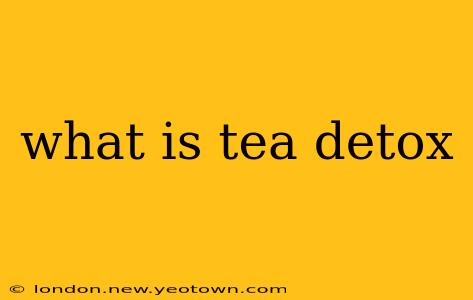The idea of a "tea detox" has captivated many seeking a quick path to better health and weight loss. But what exactly is a tea detox, and does it live up to the hype? Let's dive into the world of herbal infusions and explore the truth behind this popular wellness trend.
Imagine this: you're feeling sluggish, bloated, and your energy levels are plummeting. You see an advertisement for a "miracle tea" promising rapid weight loss and a complete body cleanse. Intrigued, you purchase it, eagerly anticipating a rejuvenated you. This scenario plays out countless times, highlighting the allure and, unfortunately, sometimes the misleading nature of tea detoxes.
The core concept revolves around the belief that specific herbal teas can flush out toxins from your body, promoting weight loss and improved overall well-being. While some teas do possess beneficial properties, the notion of a "complete body cleanse" through tea alone is largely a misconception. Our bodies have sophisticated natural detoxification systems – the liver and kidneys – that work tirelessly to eliminate waste products.
What are the common ingredients in detox teas?
Many detox teas blend various herbs and spices, each purported to offer specific health benefits. Common ingredients include:
- Senna: A well-known laxative, often used to promote bowel movements. However, overuse can lead to dependency and digestive issues.
- Dandelion root: Believed to support liver function and aid in digestion.
- Ginger: Known for its anti-inflammatory properties and ability to soothe the digestive system.
- Lemon balm: Often included for its calming and digestive benefits.
- Green tea: Rich in antioxidants and associated with various health benefits.
It's crucial to remember that the specific blend and concentration of ingredients vary significantly across different detox tea brands.
Does tea detox really work for weight loss?
This is a question that sparks much debate. While some individuals may experience a temporary weight loss due to the laxative effects of certain ingredients, this is primarily water weight and not actual fat loss. Furthermore, relying solely on detox teas for weight management is unsustainable and can be detrimental to your health. Sustainable weight loss requires a balanced diet, regular exercise, and a holistic approach to well-being.
Can tea detox help with bloating?
Certain herbal teas, particularly those containing ginger or dandelion root, may alleviate bloating by promoting digestion and reducing inflammation. However, persistent bloating should be addressed by consulting a healthcare professional to rule out underlying medical conditions.
Are there any side effects of detox teas?
Yes, there can be several potential side effects associated with detox teas, especially those containing strong laxatives like senna. These can include:
- Diarrhea: Frequent and loose bowel movements.
- Dehydration: Loss of fluids due to increased bowel movements.
- Electrolyte imbalance: Disruption of essential mineral balance in the body.
- Stomach cramps: Abdominal pain and discomfort.
- Interactions with medications: Certain detox teas may interact negatively with prescription or over-the-counter medications.
What are the risks associated with tea detox?
The biggest risk associated with detox teas is the potential for misinformation and unrealistic expectations. The idea of a rapid "cleanse" can be misleading and even harmful. Over-reliance on detox teas can neglect the importance of a balanced lifestyle, including a nutritious diet and regular exercise. Furthermore, some detox teas contain ingredients that can be harmful if consumed excessively or by individuals with underlying health conditions. Always consult a healthcare professional before incorporating detox teas into your routine, especially if you have pre-existing health issues or are taking medications.
Conclusion: A Balanced Perspective on Tea Detox
While certain herbal teas can offer various health benefits, the concept of a "tea detox" as a rapid and complete body cleanse is largely a myth. Instead of relying on these products, focus on a balanced lifestyle that includes a nutritious diet, regular exercise, and adequate hydration. If you have concerns about your health or digestive system, consult a healthcare professional for personalized advice. Remember, true well-being comes from a holistic approach, not a quick fix.

